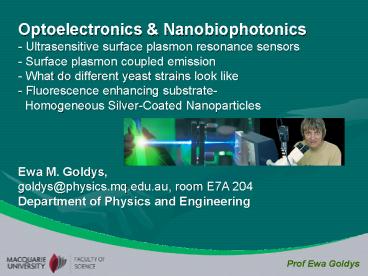Optoelectronics PowerPoint PPT Presentation
Title: Optoelectronics
1
- Optoelectronics Nanobiophotonics
- Ultrasensitive surface plasmon resonance sensors
- Surface plasmon coupled emission
- What do different yeast strains look like
- Fluorescence enhancing substrate-
- Homogeneous Silver-Coated Nanoparticles
- Ewa M. Goldys,goldys_at_physics.mq.edu.au, room E7A
204Department of Physics and Engineering
2
Sensor design
Surface plasmon resonance sensors are important
for ultrasensitive immunoassays with applications
in health diagnostics
Principle of immunoassays Reactions between two
protein molecules can be extremely specific. One
type of molecule (antibody) can be immobilised
on gold sensor surface The second (antigen) will
bind changing the refractive index This change
will be detected by changed angle of surface
plasmon resonance
- Challenges
- LED must be stable, preferably at a level
10-7 - Detector response must be linear, with similar
accuracy - Readout must be very fast
- Opportunities
- Surface plasmons probe ultrathin regions
(monolayer is enough) - System can use inexpensive components, can run
on Palm - Sample can be extremely small (microfluidics)
3
- ? Fluorescence emission is strongly directional
- ? Applications for fluorescence bioassays
4
- Aims and Significance
- ? Characterisation of microorganisms by using
intrinsic fluorescence. - ? Faster, simpler, reliable no reagents
required. - ? Possible application in industrial processes
- Process monitoring (ethanol, beer etc.)
- Identification of contaminants
Problem Variations between cells in pure
strain Diverse size, fluorescence intensity,
texture Solution Characterize populations
5
Au Core Ag-shell NP Surface 47 nm Fluorescence
enhancement of about 10
6
Bacteriuria urinary tract infection
- Lower fluorescence intensity in normal urine
than in bacteriuria (factor of 20)
Proposed mechanism - Tryptophan depletion through
increased
IDO activity accompanying the infection
PowerShow.com is a leading presentation sharing website. It has millions of presentations already uploaded and available with 1,000s more being uploaded by its users every day. Whatever your area of interest, here you’ll be able to find and view presentations you’ll love and possibly download. And, best of all, it is completely free and easy to use.
You might even have a presentation you’d like to share with others. If so, just upload it to PowerShow.com. We’ll convert it to an HTML5 slideshow that includes all the media types you’ve already added: audio, video, music, pictures, animations and transition effects. Then you can share it with your target audience as well as PowerShow.com’s millions of monthly visitors. And, again, it’s all free.
About the Developers
PowerShow.com is brought to you by CrystalGraphics, the award-winning developer and market-leading publisher of rich-media enhancement products for presentations. Our product offerings include millions of PowerPoint templates, diagrams, animated 3D characters and more.

